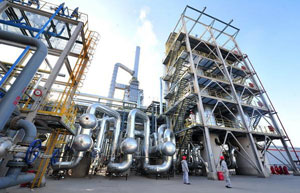These areas are still growing, and account for a significant portion of energy demand increment in China.
Coal provides 66 percent of primary energy and about 75 percent of electricity in China. The potential of hydropower is limited, and other clean-energy sources such as wind and solar are too small to make meaningful contributions. Nuclear energy could substantially replace coal but its development requires a lot of time.
So natural gas, with relatively fewer emissions, could possibly substitute more than 5 percent of coal in the primary energy mix in the next few years, given the Russian gas deal, of course.
In the long term and from a macro perspective, the Sino-Russian gas deal is important in ensuring China's energy security. China's energy import security has at least two fundamental requirements.
The first is the stability of energy-producing countries, and the second is safety of energy transportation. Russia seems to satisfy both - it is stable and also shares a long border with China.
China's dependence on foreign oil and gas is increasing rapidly. In 2013, it imported nearly 300 million tons of crude oil, indicating a foreign oil dependence of more than 58 percent. The International Energy Agency forcasts that China's dependence on foreign oil may exceed 80 percent by 2035. Current foreign dependence on natural gas is about 35 percent and also increasing rapidly.
For China to have energy security, the main thing is to reduce risk by diversifying imports.
The Middle East is China's major oil import source, accounting for about 46 percent, but the region is unstable. China's heavy dependence on transport through the Strait of Malacca, the narrow passage connecting the Indian Ocean and South China Sea, when importing crude oil is considered a significant security risk. About 80 percent of the country's imported oil comes through it. Sino-Russian energy cooperation could reduce import risks and is deemed important for China's energy security.
The natural gas contract between China and Russia is an important step toward diversifying China's gas imports. It can be considered a major accomplishment of China's strategic arrangement of "four-corner" gas passages.
With the signing of the deal, the northwestern, northeastern, southwestern and ocean strategy passages have taken shape. The northwestern one is the Central Asia-China gas pipeline, the southwestern one is the China-Myanmar gas pipeline, the northeastern one is the China-Russia pipeline and the eastern maritime passage is comprised of liquefied natural gas imports.
The combined passages will ensure multiple sources of natural gas and increase the share of natural gas in the energy structure in a relatively short time. The formation of energy passages contributes to ensuring China's energy security, which helps diversify import channels, sources and types of energy.
The author is director of the China Center for Energy Economics Research at Xiamen University. The views do not necessarily reflect those of China Daily.
|
 |
 |
